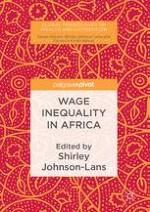2017 | OriginalPaper | Chapter
Foreign Direct Investment and Racial Wage Inequality: Evidence from South Africa
Authors : Shirley Johnson-Lans, Patricia Jones
Published in: Wage Inequality in Africa
Publisher: Springer International Publishing
Activate our intelligent search to find suitable subject content or patents.
Select sections of text to find matching patents with Artificial Intelligence. powered by
Select sections of text to find additional relevant content using AI-assisted search. powered by
